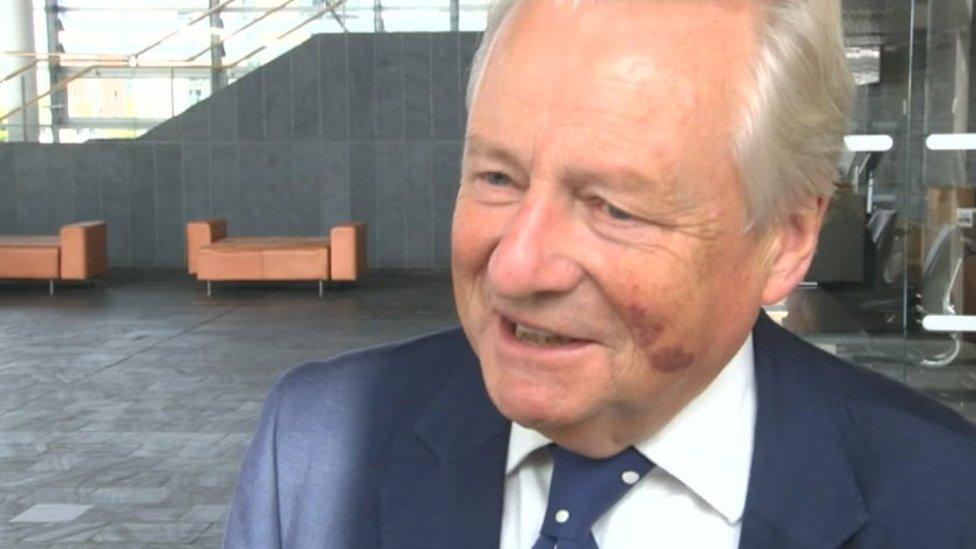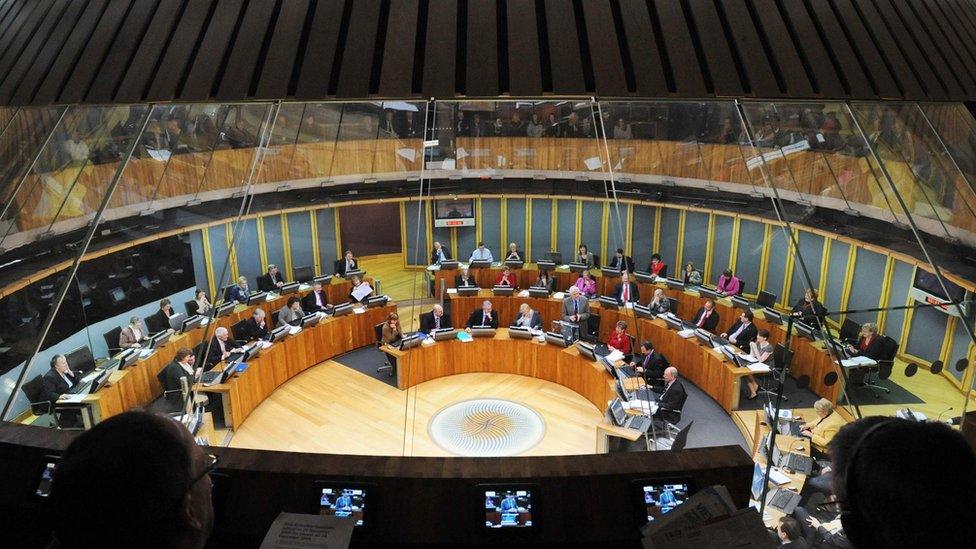Wales Bill still threatens roll back in powers, say AMs
- Published
Huw Irranca-Davies claims the bill makes devolution 'more complex and bureaucratic'
Plans to give more power to the assembly could still result in a "roll-back" of devolution, an assembly committee has claimed.
The Wales Bill, currently passing through Parliament, was revised earlier this year amid concern it could dilute the power of AMs to make laws.
But the cross-party said the bill remains over-complicated.
The UK government claimed the bill would secure "stronger" devolution.
Huw Irranca-Davies, committee chairman, said: "The extra red tape which comes with this bill, at a time when the UK government advocates cutting bureaucracy, means it may not be long before we are all back around the table trying to thrash out a new, lasting constitutional settlement for Wales, something this law was promised to be."
The Labour AM and former MP said: "It will be the first Wales Bill to reverse devolution.
"We welcome some elements - the devolution of electoral arrangements and the recognition of the permanence of the assembly.
"But it increases red tape and complexity."

The House of Lords is to consider the bill as part of its progress through Parliament next week.
"There is now a great burden of responsibility on the Lords to amend this bill," Mr Irranca-Davies said.
The Wales Bill shakes up how power is divided between the assembly and Westminster by changing how powers are defined.
Currently, the areas that AMs can make new laws on are defined in legislation.
But under the planned system, the areas that will remain in Westminster's hands will be set out in a list of reserved powers, with AMs being told what they cannot legislate on rather than what they can.
It also gives the assembly new powers over elections, energy and transport, as well as the ability for the assembly to change its name.
Following criticism, the UK government announced it would shorten the original draft list of reserved powers.
It had promised to change legislative tests that some had argued would reduce the assembly's ability to make law.
But the committee report said the changes had not gone far enough and could still result in a "roll-back".
AMs also said that even though the reservation list had been shortened, in many cases powers had simply been lumped into one category instead.
The report claimed that the law remains complex and unclear - and calls into question how long it would be before another devolution law was needed.
This is made worse, it argued, by the failure to provide a distinct or separate jurisdiction for law in Wales. Currently Wales shares a legal jurisdiction with England.

Lord Dafydd Elis-Thomas said the Wales Bill was a "legislative failure on the part of the imperial capital"
Plaid Cymru AM, committee member and former assembly presiding officer Lord Dafydd Elis-Thomas said: "It's a legislative failure on the part of the imperial capital and its works."
The report also said the bill fails to put Wales on a par with Scotland and Northern Ireland in terms of powers and responsibilities, and criticised the speed that it passed through the House of Commons.
The Conservatives are represented on the committee by David Melding, an ex-deputy presiding officer.
But Welsh Tory leader Andrew RT Davies broke with the committee's consensus to defend the Wales Bill as a "landmark piece of legislation".
The bill would "offer greater clarity and accountability than ever before in the devolved era", he said, and provide "an opportunity to move on from constitutional affairs".
A Wales Office spokeswoman said: "The UK government is committed to creating a stronger Wales within the United Kingdom.
"The Wales Bill will secure a stronger, clearer and fairer devolution and is based on the cross-party St David's Day agreement.
"The calls to introduce a separate legal jurisdiction would add costs and increase complexity and have been rejected by the government and opposition in parliament."
- Published7 June 2016

- Published18 May 2016

- Published29 February 2016

- Published29 February 2016
